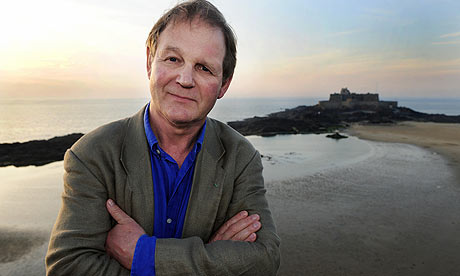Private Peaceful by Michael Morpurgo (Harper Collins, 2003)
187 pgs;
told in 13 sections over the course of one night.
Subjects:
World War One, England, Belgium, Flanders, Ypres, deserters, junior fiction/junior
YA (Year 7-10)
Also made
into a film (2012) and a one-man stage show (although from what I've read, this
has a different ending). The film
has a study resource which includes interviews with Michael Morpurgo and screen writer Simon Reade, as well as a trailer.
Synopsis
The story is told in a series of flashbacks by Private Tommo Peaceful, aged nearly 18, who spends one long night waiting for the dawn and remembering back over his life so far. The reason for his night-long vigil is hinted at but contains an unexpected twist at the end.
The story is told in a series of flashbacks by Private Tommo Peaceful, aged nearly 18, who spends one long night waiting for the dawn and remembering back over his life so far. The reason for his night-long vigil is hinted at but contains an unexpected twist at the end.
Tommo grew
up in a small village in Devon with his two older brothers, Charlie (whom he
idolises) and Big Joe, who is mentally handicapped. The first half of the book
deals with his childhood: schooling, his
father’s death, his mother’s desperate efforts to keep the family together and
the girl – Molly – whom both he and Charlie fall in love with, although it’s
Charlie who wins and marries her. The
pressure put on young men and boys to sign up for war is clearly shown when the
sergeant major comes to town with his band of soldiers, “splendid in their
scarlet uniforms.”
Both
Charlie and Tommo (aged nearly 16) sign up and are sent to the trenches near
Ypres, where they soon realise there is nothing splendid about war at all. The
bullying behaviour of one of the army sergeants, and Charlie’s refusal to
kowtow to him, is a constant theme, as is the fierce loyalty between the two
brothers. At the end these two themes coincide, with fateful results.
Questions:
Do you
think Charlie did the right thing when he refused to leave Tommo? What would
have happened to him if he had left Tommo? What would have happened to Tommo?
The motto
on the cover says “Innocence and love, courage and cowardice.” How are each of
these qualities dealt with in the book?
Reviews:
Here is a review of the book from the Booksellers New Zealand blog. This review on the Independent website talks about "Why children should see Michael Morpurgo’s ‘Private Peaceful" (the movie).
Reviews:
Here is a review of the book from the Booksellers New Zealand blog. This review on the Independent website talks about "Why children should see Michael Morpurgo’s ‘Private Peaceful" (the movie).
Author’s
website:
Michael Morpurgo's website includes
worksheets, posters and book covers to download.
He has written a
number of other war-related books, notably The
war horse (also made into a film.)

Other books
you might like:
The silver donkey by Sonya Hartnett also deals with the
topic of army deserters and how they were treated.
So does My brother's war by David Hill (NZ author).
My review of The silver donkey includes some information on the Shot at Dawn Memorial in Britain which is a memorial to some of these young men from Britain and the Commonwealth.
So does My brother's war by David Hill (NZ author).
My review of The silver donkey includes some information on the Shot at Dawn Memorial in Britain which is a memorial to some of these young men from Britain and the Commonwealth.
New Zealand connections:
Desertion was treated as a crime by the army and could be punished
by court-martial and execution. On pg 47 of Anzac Day: the New Zealand story is a section called “Pardoned at
last”. This tells the story of the men who were court-martialled for mutiny or
desertion, often because they were suffering from undiagnosed shell shock. Many
of these men had fought bravely in other parts of the war but had just reached
the limit of what they could endure. Their deaths were seen as terribly
shameful for their families and often they were not talked about for years.
In 2000, the Pardon for Soldiers of the Great War Act was passed to
pardon the five NZ soldiers who were subsequently shot. You can read more about the Act here.
The medals and certificate of pardon for one of the
soldiers, Victor Spencer, were later gifted to the Bluff Maritime Museum.
The story of two of the five soldiers, both born in Australia, is told further in this transcript: "ANZAC tragedies revealed after 80 years: the stories of Private John Sweeney and Frank Needs / John King
, both Australians who signed up in NZ, and served bravely in Gallipoli but
were charged with desertion in France and shot."
(It’s interesting to note that
Australian never allowed its own soldiers to
be shot, perhaps because the AIF was only ever made up of volunteers - conscription was voted against twice by the
Australian public during WW1 – and the public outcry would have been huge. But
these two men had signed up for the NZ army.)


No comments:
Post a Comment